Decade of Dedication Pays Off for Arian Kashani at UKIPT Nottingham
Table Of Contents
Arian Kashani’s journey to the pinnacle of the UK and Ireland Poker Tour Nottingham Main Event was as inspiring as it was rewarding. After 11 years of grinding through obstacles and setbacks, Kashani’s persistence paid off as he triumphed over a field of 1,282 entries at Dusk Till Dawn, claiming £201,900 after defeating Philip Joyce heads up.
Joyce was a familiar foe for Kashani, as both players made deep runs in the EPT Cyprus Main Event. Joyce bowed out in 12th place at the Merit Royal Diamond Hotel Casino in October, with Kashani coincidentally finishing one spot above him as he did so in Nottingham.
The event, which smashed its £1,000,000 guarantee by generating a prize pool of £1,230,720, saw Kashani not only outlast some of the toughest competition in poker but also fulfil a personal dream forged a decade ago when he was first captivated by the intensity of poker on TV.
Now, he’s no longer just a spectator but a champion, proving to himself and the poker world that hard work and perseverance yield results. For Kashani, this victory isn’t just about the prize money; it’s a validation of his unwavering belief in his potential.
UKIPT Nottingham Main Event Final Table Results
| Place | Player | Country | Prize |
|---|---|---|---|
| 1 | Arian Kashani | Iran | £201,900 |
| 2 | Philip Joyce | United Kingdom | £126,000 |
| 3 | Christopher Brammer | United Kingdom | £90,000 |
| 4 | Parminder Kandola | United Kingdom | £69,200 |
| 5 | Michael Casson | United Kingdom | £53,680 |
| 6 | Yannik Seabrook | United Kingdom | £41,300 |
| 7 | Justin Tsui | Hong Kong | £31,760 |
| 8 | Nathan Slater | United Kingdom | £24,430 |
| 9 | Daniel Rudd | United Kingdom | £18,780 |
Winner’s Reaction
PokerNews caught up with Kashani after his incredible victory, where he shared his thoughts on the win and his journey to the top.
“I’m a little bit emotional right now,” Kashani admitted. “I’ve been at this for eleven years. There have been a lot of obstacles, setbacks, and disappointments, but I’ve always managed to push through, stay consistent, and persevere when things got tough.”
Kashani reflected on his rise to prominence: “People have only started noticing me because of the results, but I’ve always believed I had what it takes. I’ve worked really hard, and today was the day. It’s such a nice feeling.”
Kashani’s poker journey began over a decade ago, inspired by watching the European Poker Tour on TV. “I didn’t even know the rules back then,” he said, “but I loved how intense it was. I loved the competitiveness and everything about it. I was drawn to it and hooked. And now, a decade later, I’m competing with these guys—and not just competing, but outlasting them. It’s very, very rewarding.”
 In addition to his success at the tables, Kashani has been coaching for the past two and a half years, helping his students achieve their own poker dreams. “That’s a very rewarding feeling as well,” he said.
In addition to his success at the tables, Kashani has been coaching for the past two and a half years, helping his students achieve their own poker dreams. “That’s a very rewarding feeling as well,” he said.
When asked about his approach to the game, Kashani emphasized the importance of focusing on good decision-making over immediate outcomes. “I don’t really think about whether it’s ‘my day.’ I just try to focus on every decision and only that decision. If you’re making good decisions in the long term, the results will come.”
Despite the demanding nature of poker, Kashani’s passion remains undiminished. “I never take a break—I love what I do. I love the game, the problem-solving aspect, the human psychological aspect of it. I love it all. It’s so diverse. There’s nothing else in the world that brings together so many people from so many different backgrounds. It’s very, very unique.”
This love for the game and relentless drive have propelled Kashani to the top, making his victory at Dusk Till Dawn a moment to remember.
Final Day’s Action
Day 3 began with 21 hopefuls, but within two levels, the field was rapidly reduced to just 12 as a wave of eliminations swept through the tables. Kashani was on a tear, claiming multiple victims before sending Abraham Gozum to the rail in tenth, narrowly missing the final table.
Kashani entered the final table with a commanding chip lead, but Michael Casson quickly emerged as a major contender after doubling up with Big Slick against Nathan Slater’s pocket queens.
The first final table casualty came when Daniel Rudd four-bet shoved from the button with ace-deuce, only to collide with Joyce’s ace-king. The board ran clean for Joyce, and Rudd was the first player to depart the final table.
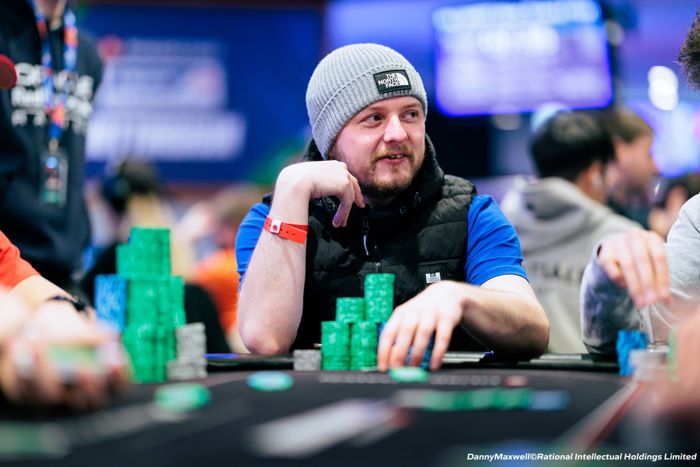 Slater then four-bet shoved with ace-nine, running into Joyce’s pocket queens. However, an ace on the flop delivered Slater a timely double-up, reigniting his hopes. Determined to keep the momentum, Slater stayed aggressive, but the tables soon turned.
Slater then four-bet shoved with ace-nine, running into Joyce’s pocket queens. However, an ace on the flop delivered Slater a timely double-up, reigniting his hopes. Determined to keep the momentum, Slater stayed aggressive, but the tables soon turned.
A few orbits later, Joyce found himself in a similar spot, four-bet shoving with ace-five suited. This time, it was Kashani who put him at risk with ace-king. A king on the flop all but sealed Joyce’s fate, leaving Slater to wonder what might have been.
Parminder Kandola endured a rollercoaster of emotions in back-to-back hands. First, he lost a chunk of his stack to Justin Tsui when his ace-nine was poised to eliminate Tsui’s queen-jack. However, a dramatic queen on the river kept Tsui’s tournament hopes alive.
Undeterred, Kandola shoved in the very next hand with king-jack, only to run straight into Casson’s pocket aces. It seemed Kandola was destined to hit the rail, but the poker gods had other plans. A jack on the flop and a king on the river turned the tide, allowing Kandola to escape elimination.
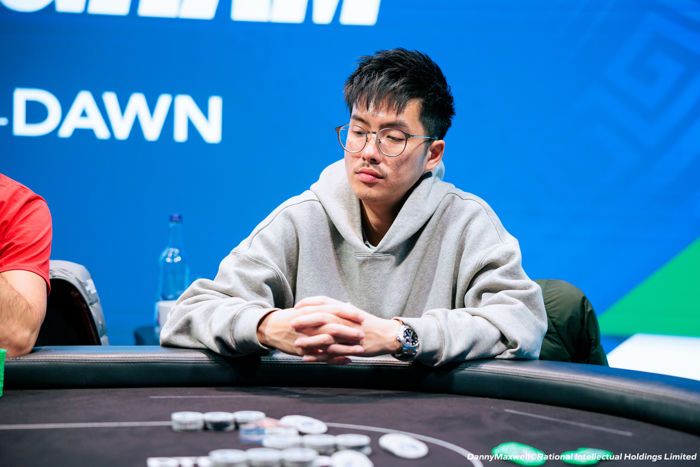 Tsui entered the final table in seventh place and finished in the same spot. His tournament run ended when he three-bet shoved with queen-ten, only to be called by Kandola’s pocket jacks. The board offered no assistance to Tsui, and one of just three players from Hong Kong in the tournament was sent to the rail.
Tsui entered the final table in seventh place and finished in the same spot. His tournament run ended when he three-bet shoved with queen-ten, only to be called by Kandola’s pocket jacks. The board offered no assistance to Tsui, and one of just three players from Hong Kong in the tournament was sent to the rail.
Yannik Seabrook was the next to fall, following Tsui to the rail. His ace-five faced off against Joyce’s ace-queen in a pivotal hand. Seabrook found hope when he flopped a five and turned an ace, but a nine on the river paired the board, counterfeiting his hand. With that, Seabrook’s tournament run ended in sixth.
Start-of-day chip leader Casson was the next to bow out, falling victim to a dramatic river. Casson committed his stack with ace-deuce against the current chip leader, Kashani, holding king-queen. The board ran clean for Casson until the river, where Kashani completed a gutshot straight to end Casson’s run in fifth place.
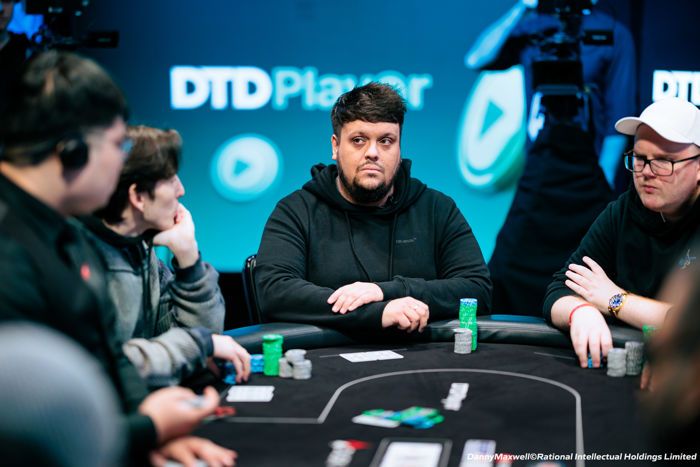 Four-handed play was a tense battle, with Christopher Brammer seemingly on the verge of missing out on a podium finish. All-in and at risk with pocket eights against Kashani’s pocket kings, Brammer’s tournament life hung by a thread. But the poker gods smiled upon him as an eight landed on the flop, delivering him a set and a crucial double-up, which catapulted his stack within striking distance of Kashani.
Four-handed play was a tense battle, with Christopher Brammer seemingly on the verge of missing out on a podium finish. All-in and at risk with pocket eights against Kashani’s pocket kings, Brammer’s tournament life hung by a thread. But the poker gods smiled upon him as an eight landed on the flop, delivering him a set and a crucial double-up, which catapulted his stack within striking distance of Kashani.
Brammer briefly claimed the chip lead after extracting maximum value from Kashani with a well-timed pot-sized river bet. However, his reign at the top was short-lived. Moments later, Kashani regained the lead by calling Joyce’s river bluff in a three-way pot, firmly reasserting his dominance.
Kandola’s tournament run ended as his shove-or-fold strategy failed to deliver results. He moved all-in with ace-eight but ran into Kashani’s pocket tens. The board offered no help to Kandola, and after a clean runout, the field was reduced to the final three.
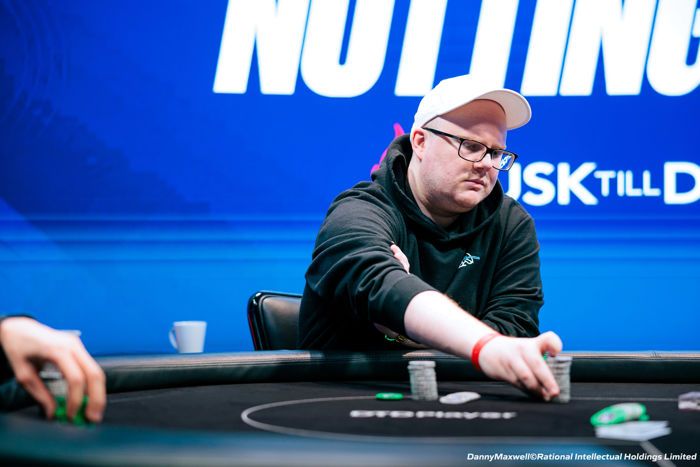 Three-handed play saw Kashani twice poised to eliminate Brammer, but the finishing blow eluded him. Kashani picked up pocket aces in the first confrontation and called Brammer’s four-bet with ace-king. The post-flop action unfolded cautiously on a dicey board, and Brammer managed to fold on the river, escaping relatively unharmed.
Three-handed play saw Kashani twice poised to eliminate Brammer, but the finishing blow eluded him. Kashani picked up pocket aces in the first confrontation and called Brammer’s four-bet with ace-king. The post-flop action unfolded cautiously on a dicey board, and Brammer managed to fold on the river, escaping relatively unharmed.
Not long after, Brammer turned a flush with jack-five, only for a fourth diamond on the river to give Kashani the nuts. Despite paying off a sizable river bet, Brammer held on, defying the odds and staying in contention.
Despite Kashani chipping away at Brammer’s stack throughout three-handed play, Joyce landed the final blow. Brammer moved all-in with king-seven, and Joyce called with ace-five of diamonds. The board was decisive, as Joyce flopped a flush, leaving Brammer drawing dead and exiting the tournament in third place.
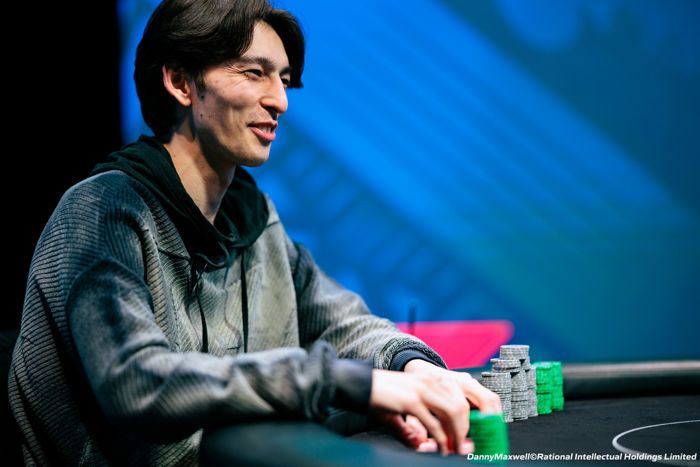 Kashani entered heads-up play with a three-to-one chip lead over Joyce, but that advantage vanished in the very first hand. Joyce flopped top pair with jack-ten, while Kashani picked up a flush draw and had two overcards. The chips went in on the turn, but the river bricked out for Kashani, levelling the stacks and setting the stage for a fascinating heads-up match.
Kashani entered heads-up play with a three-to-one chip lead over Joyce, but that advantage vanished in the very first hand. Joyce flopped top pair with jack-ten, while Kashani picked up a flush draw and had two overcards. The chips went in on the turn, but the river bricked out for Kashani, levelling the stacks and setting the stage for a fascinating heads-up match.
After chipping away at the stack of Kashani, Joyce had a chance to take victory but would need the deck’s help as his pocket threes were up against the pocket fives of Kashani. Unfortunately for Joyce, the board ran out clean, which put Kashani back in the lead.
Not long after it was all over, Kashani raised the button with king-queen and then called the shove of Joyce, who had ten-nine. A nine on the flop was good for Joyce, but Kashani backdoored a flush to win the title.
Congratulations to Kashani on his incredible victory and well-deserved moment in the spotlight. His triumph in the UKIPT Nottingham Main Event showcased his skill and perseverance and was an inspiring reminder of what dedication and passion can achieve.
FAQ
Can you play WPT global on phone?
Can you play WPT global on phone? Create an account to join the WPT Global poker community. Choose your poker nickname, fill in a few details and verify your email, then you’re all set. Download poker to your PC, Mac, mobile or tablet and start playing the games you love in minutes.
What is the WPT bonus code?
What is the WPT bonus code? The WPT bonus code is WPT777. Use this code at WPTglobal.com to get up to $1200 poker bonus. This code has been approved by WPT Global and gives new users the maximum new user offer.
Can I use tracking software or a HUD?
Can I use tracking software or a HUD? No, the use of third party software is prohibited.
Is it safe to play on WPT Global?
Is it safe to play on WPT Global? WPT Global is licenced in Curaçao by Gaming Services Provider N.V. and its RNG (random number generator) is independently certified by Gaming Laboratories International (GLI).
What are the Big Bass Bonanza multipliers for each retriggered 10 free spins round?
What are the Big Bass Bonanza multipliers for each retriggered 10 free spins round? The first retrigger gives the wild a 2x multiplier, the second retrigger gives a 3x multiplier, and the third retrigger gives a 10x multiplier on your wild.
Download & Play WPT Global Application In Shortly
This site only collects related articles. Viewing the original, please copy and open the following link:Decade of Dedication Pays Off for Arian Kashani at UKIPT Nottingham











